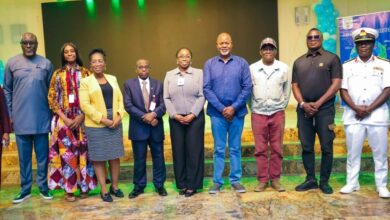
As a result of the the recent incident of a sunken barge and chemical pollution at the Mile 2 Jetty, Lagos, where continuous rainfall has worsened toxic leakage into the waterways, threatening marine life and public health, the Sea Empowerment and Research Center (SEREC) has called for the creation of a dedicated directorate under the Ministry of Marine and Blue Economy.
According to the SEREC Head of Research, Fwdr Eugene Nweke who made the call in a press release, verified reports from Harboursandport.com and other maritime monitors revealed that industrial chemicals stacked at Clarion Shipping Terminal and surrounding locations have been seeping into adjacent waters with no visible regulatory intervention.
He viewed this as a critical wake-up call for the Nigerian government to strengthen the institutional and administrative architecture of barge operations, which remain weakly coordinated across multiple agencies , leaving dangerous lapses in safety, pollution control, and accident response.
Nweke urged the Minister of Marine and Blue Economy, Adegboyega Oyetola to establish a Directorate of Barge Operations and Logistics Services (DBOLS) , headed by a Director and supported by a Deputy Director for technical coordination and logistics reforms.
He explained that this Directorate would: enforce mandatory registration, inspection, and certification of all commercial barges and tugs, institute national safety and environmental standards for barge design, loading and operations, deploy vessel tracking systems (AIS/GPS) for inland waterway traffic monitoring, supervise terminal licensing, accident reporting and pollution control and drive training, certification, and job creation within the marine logistics sector.
From SEREC’s economic model and comparative studies, establishing the DBOLS and its regulatory infrastructure is estimated at ₦8–10 billion (approx. USD 5.5–6.5 million) for initial staffing, digital systems, and safety equipment across six major inland maritime zones. Also, properly regulated barge licensing, inspection, and certification can yield over ₦60–80 billion (USD 40–50 million) annually through: vessel registration and inspection fees, cargo movement levies, inland waterway terminal licensing, and environmental compliance charges.
The SEREC Head of Research explained that by unlocking safer inland logistics, Nigeria could attract ₦250–300 billion (USD 180–200 million) in private investments over the next decade from shipping companies, dredging firms, terminal operators, and barge manufactures
Considering the environmental and economic impact, he said every 100 cargo-laden barges can remove 1,000 trucks from Nigerian highways, reducing road maintenance costs and CO₂ emissions by up to 30% annually.
Fwdr Nweke underscored that many nations have transformed their inland waterways into engines of logistics and job creation through structured barge management. He cited India’s IWAI which oversees 111 national waterways, drawing billions in PPP investments and providing over 100,000 inland logistics jobs and U.S. Army Corps of Engineers that centrally manages inland navigation with a maintenance budget exceeding USD 3 billion, ensuring safe and efficient barge transport amongst others.
He urged Oyetola to: approve the creation of the Directorate of Barge Operations & Logistics Services (DBOLS), appoint a Deputy Director of Barge Operations to immediately coordinate regulatory and safety functions, establish an inter-agency emergency task force to address the Mile 2 pollution and strengthen monitoring nationwide and fast-track the National Barge Modernisation and Regulation Framework (NBMRF) under the Blue Economy agenda.
“Barge operations are the arteries of our inland maritime economy. With proper regulation, they can decongest highways, reduce transport costs by up to 40%, create tens of thousands of jobs, and protect our marine ecosystems.”, he wrote.











One Comment